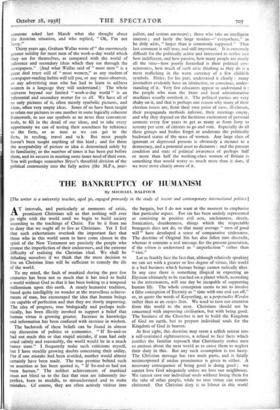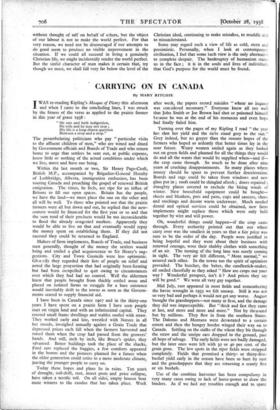THE BANKRUPTCY OF HUMANISM
By MICHAEL BALFOUR [The writer is a university teacher, aged 3o, engaged primarily in the study of recent and contemporary international politics.] of the world. _ To my mind, the fault of mankind during the past few. centuries has been not so much that it has tried to build. a world without God as that it has been looking to a temporal millennium upon this earth. A steady humanist tradition, based quite intelligibly on wonder at the marvellous achieve- ments of man, has encouraged the idea that human beings are capable of perfection and that they are slowly improving. The idea of progress, true biologically and perhaps tech- nically, has been illicitly invoked to . support a belief that human virtue, is growing greater. Increase. in knowledge and information has been confused with increase in wisdom.
.The backwash of these beliefs can be found in almost any discussion of politics or economics. " If So-and-so had not made this or that stupid mistake, if man had only acted calmly, and reasonably, the world. would be in a much better state."' . I frequently make such criticisms myself, but I have steadily growing doubts concerning their utility. For if one mistake had, been avoided, another would almost certainly have been made. The true premise behind such an assertion as has been quoted is, " If So-and-so had not been human." The noblest achievements of mankind must- not blind us to. the fact that men are inherently im- perfect, born to muddle, to misunderstand and to make mistakes. Of course, they are often actively -vicious into the bargain, but I do not want at the moment to emphasise that particular aspect. For sin has been unduly represented as consisting in positive evil acts, uncleanness, deceit, fornication, drunkenness, things which the respectable bourgeois does not do, so that many average " men of good will " have developed a sense of comparative sinlessness. The doctrine of Original Sin has also fallen into discredit, whereas it contains a real message for the present generation, if the vitium is understood as "imperfection " rather than " vice."
Let us frankly face the fact that, although relatively speaking we can act with a greater or less degree of virtue, this world is a bad business which human beings cannot radically alter. In any case there is something illogical in expecting an Elysium ultimately to be reached on a planet which, according to the astronomers, will one day be incapable of supporting human life. The whole conception seems to me to involve a false conception of Eternity as " time with one end cut off," or, to quote the words of Keyserling, as a perpetuelles Werden rather than as an ewiges Sein. We need to turn our attention from this world to the next. Christians should not be concerned with improving civilisation, but with being good. The business of the Churches is not to build the Kingdom of God on earth, but to prepare individual souls for the Kingdom of God in heaven.
At first sight, this doctrine may seem a selfish retreat into a self-contained righteousness, a refusal to face- facts which justifies the familiar reproach that Christianity makes men so anxious about the next world as to cause them to neglect their duty in this. But any such assumption is too hasty. The Christian message has two main parts, and is fatally misinterpreted if undue prominence is given to either. A necessary consequence of being good is doing good ; we cannot love God adequately unless we love our neighbours. We cannot save our ;individual souls without losing them for the sake of other people, while no true virtue can remain cloistered. Our Christian duty is to labour in this world without thought of self on behalf of others, but the object of our labour is not to make the world perfect. For that very reason, we need not be discouraged if our attempts to do good seem to produce no visible improvement in the situation. If we could all succeed in living a genuinely Christian life, we might incidentally render the world perfect. But the sinful character of man makes it certain that, try though we must, we shall fall very far below the level of the Christian ideal, continuing to make mistakes, to muddle an to misunderstand.
Some may regard such a view of life as cold, stern anC_ pessimistic. Personally, when I look at contemporar. civilisation, I feel that some such view is the only alternative to complete despair. The bankruptcy of humanism stare, us in the face ; it is in the souls and lives of individual that God's purpose for the world must be found.

























































 Previous page
Previous page